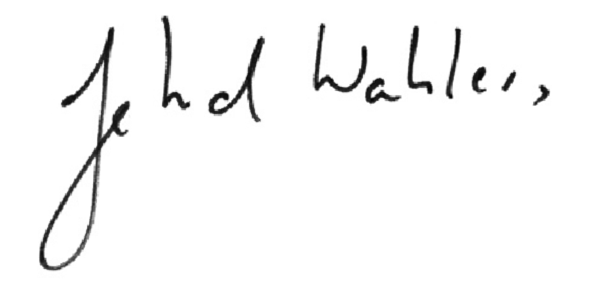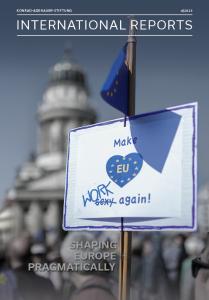Issue: 4/2023
The conclusion to be drawn from this panorama – that Europe should develop a greater capacity for action and self-assertion externally – is so obvious that it is hard for political players to ignore. So there is no lack of insight: “Europe must learn the language of power” – this is one of the phrases that tend to be used in this context.
And the reality? In a recent survey by the Konrad-Adenauer-Stiftung, fewer than four in ten Germans associate the European Union with the notion of “global strength”. This is no coincidence. The EU’s reaction to Russia’s attack on Ukraine may have been gratifyingly unified, yet almost two years after the start of the war, Europe is still unable to honour its promises in terms of military support for Kyiv, for example with regard to ammunition deliveries. And if Trump were to be re-elected, we would not be much better prepared than we were the first time round.
This also has to do with the fact that European policy debate tends to remain vague, consisting of fine-sounding yet often unrealistic visions of the future, along with almost imploring invocations that Europe should finally – and this time really – speak with one voice. There is nothing wrong with engaging in long-term debate about fundamental issues and setting out great ambitions. But these must not obscure the view of what has to take priority in light of the precarious global situation: a policy that focuses on pragmatic solutions and on the things that can be dealt with swiftly.
This applies in the field of defence policy. Ideas such as the creation of a European army are so far-reaching that they have little prospect of being realised in the near future, but there are some areas where concrete improvements could be made. One example is increasing the military power of the individual states. For example, Germany still has neither the capabilities to fulfil its key role in the conventional defence of Europe, nor a reliable plan as to how this might be achieved in the future. Another example is defence cooperation: here it is also up to national governments to play a facilitating role – if not in bringing to fruition a great pan-European project, then at least in advancing joint armaments projects between a limited number of states.
Concrete progress on such issues is also important because it would help take the wind out of the sails of those voices in America who primarily see the close ties maintained by the United States with the “Old World” as an unnecessary cost. It cannot be emphasised often enough: keeping the United States “in Europe” will remain the most effective means of ensuring our security for the foreseeable future.
In the area of foreign policy in general, too, there is no point in waiting forever for the moment when a unified European policy will suddenly be released onto the world. European foreign policy is and remains first and foremost the foreign policy of the European states – even though a determined Commission President has been able to strengthen Brussels’ foreign policy role in recent years, as Felix Müller shows in this issue of International Reports.
In many instances, a common European foreign policy is doomed to fail simply because the interests and positions of the current 27 member states are too heterogeneous. This is why the introduction of majority decision-making in this area has been under discussion for a long time. Such a procedure would indeed make it easier to arrive at decisions. Nonetheless, every member state – including those that have repeatedly blocked European agreements in the recent past – would have to agree to this change of procedure, which is why it is unlikely to happen in the foreseeable future. And even if it did come about: does the German government really want to risk being outvoted on foreign policy issues such as its stance on the war in the Middle East?
We should first devote our energy to achieving as much agreement as possible through constant dialogue within Europe – while at the same time acting in concert with those countries with which there is the greatest agreement.
Another area in which swift action is required is that of EU enlargement policy. As a space in which freedom and justice are upheld, the European Union continues to appeal to many people in its neighbourhood, even – or perhaps especially – if their government pursues a completely opposing course, as Jakob Wöllenstein illustrates in his article on Belarus. But there is no need to look as far as countries where EU membership will not be an issue in the near future. The number of actual membership candidates is already considerable. The six Western Balkan states have been on hold for almost 20 years, while Georgia, Moldova and Ukraine also applied for membership in 2022. The process is driven forward at an accelerated pace now, particularly in the case of the latter two countries, and rightly so. But this type of resolute approach is needed with regard to the Western Balkans, too. As these countries pursue their path into the EU, it is undisputed that the strict membership criteria must not be eased in such a way that we would end up being bigger but weaker as a community. But another thing is clear, too: in the course of the enlargement process of the coming years, geostrategic considerations should play a greater role than in the past, since our aim must be to counter the influence of states such as Russia and China in our immediate neighbourhood.
Europe’s economic strength – the area in which we still play in the same league as the United States and China – is also significant in terms of its potential for action. The primary objective of European economic policy should therefore be to ensure that our continent continues to be competitive. As Tim Peter emphasises in his article, the widespread idea, particularly on the left, that only ever-increasing – and preferably joint – debt will enable the sustainable restructuring of the European economy is misleading. Rather, long-term financial stability is the prerequisite for being able to make the necessary investments in the ecological and digital transformation on our continent. And ultimately, as in so many other areas, it comes down to the member states, too: it makes a difference who is in power in the European capitals. Marian Wendt and Eleftherios Petropoulos demonstrate this impressively in their article focusing on the example of Greece, which in recent years has shaken off the role of economic problem child.
European energy policy has seen major upheavals since 2022. Due to the loss of Russian gas supplies, Europe was faced with the challenge of having to meet its energy needs in other ways, while at the same time pushing ahead with its plans for decarbonising the energy sector. Although the EU as a whole has so far come through this crisis better than originally feared at the outbreak, it is still often a hindrance to itself due to a lack of flexibility, as Veronika Ertl and Philipp Dienstbier point out in their article on the plans for energy cooperation between the EU and the Gulf states. Europeans’ current reluctance to consider natural gas supplies as part of such a cooperation in the longer term and to make concessions in their ambitious definitions of low-carbon hydrogen has not yet succeeded in bringing a single additional cubic metre of sustainable fuel from the Gulf to Europe, but it does threaten to push countries such as Saudi Arabia, Qatar and the United Arab Emirates further towards focusing on the Asian energy market.
Few issues in Europe are currently as politically explosive as migration policy. As Lars Hänsel rightly points out in this issue, it will be vital to ensure more effective management of migration movements to Europe in future, not least because we have seen far too often in recent years that otherwise one of the ultimate achievements of European integration – namely people’s freedom of movement within Europe – will gradually be lost. We should not become accustomed to trains having to stop at the first station after the German-Austrian border until the federal police have checked the papers of all passengers. It is a good sign that negotiations on a reform of European asylum law have recently made progress after years of deadlock. Now a leap of faith is required from those political forces in particular that have so far prioritised their ideological peace of mind over a consideration of reality. After all, who stands to benefit if the parties in the political centre ignore the problem until those players in Brussels and the member states who have no interest whatsoever in striking a balance between humanity and control become even stronger? Polls currently suggest that the forces to the right of the European People’s Party are still on the rise, as Olaf Wientzek highlights in his article.
All this does not mean that no thought should be given to long-term institutional reforms of the European Union and ways to achieve a more unified Europe. But until we come up with the premium solution – if this were ever to happen – we need to get on with the many small, less glamorous, but quickly achievable things that will enable us to survive in an uncomfortable global environment. Europe will remain a continent of diversity – and this also means a diversity of interests. The debate on how we can deal with these differences constructively and where we might simply leave them to one side instead of looking for uniform standards will also be crucial with a view to the European Parliament elections in early summer 2024.
I hope you will find this report a stimulating read.
Yours,

Dr. Gerhard Wahlers is Editor of International Reports, Deputy Secretary General and Head of the Department European and International Cooperation of the Konrad-Adenauer-Stiftung (gerhard.wahlers@kas.de).





